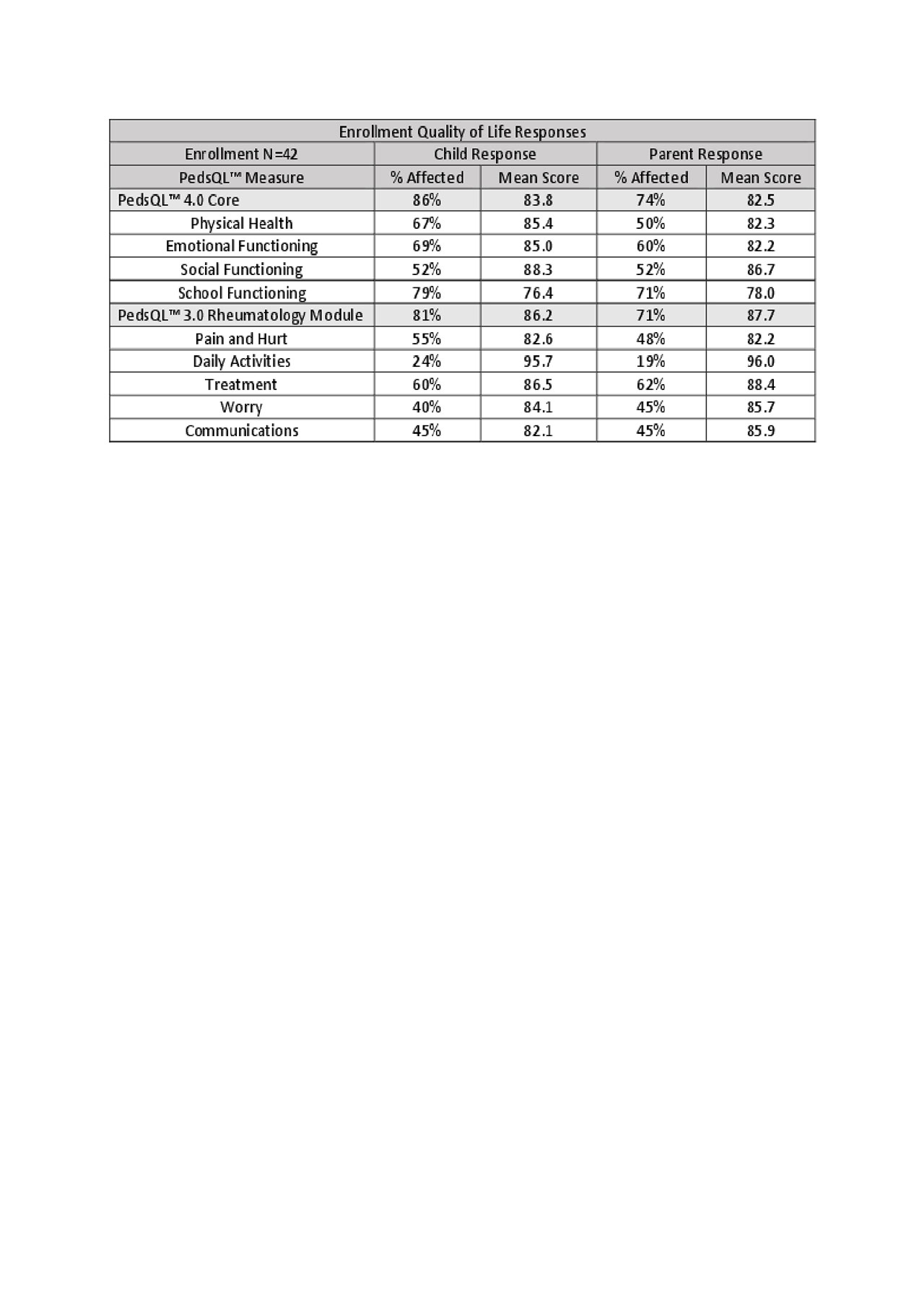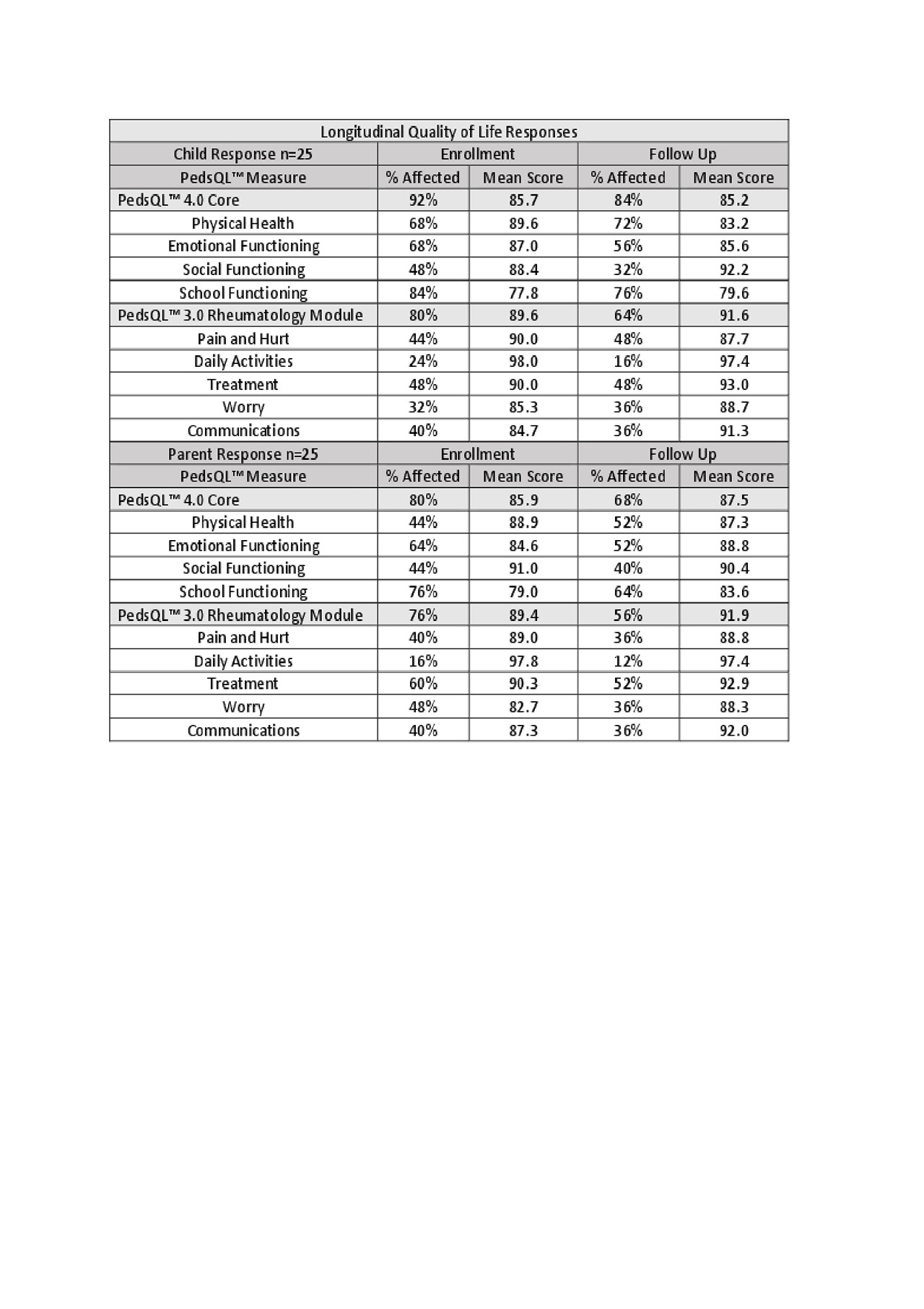Session Information
Date: Monday, November 11, 2019
Title: Pediatric Rheumatology – ePoster II: SLE, Juvenile Dermatomyositis, & Scleroderma
Session Type: Poster Session (Monday)
Session Time: 9:00AM-11:00AM
Background/Purpose: Systemic Lupus Erythematosus (SLE) can be a severe disease, especially when diagnosed in childhood. Onset prior to puberty (Tanner stage II) is rare, and less is known about the impact SLE has on this pediatric subpopulation. We assessed clinical and quality of life (QOL) measures in a pre-pubertal SLE onset cohort to better globally understand the burden of this disease in this group.
Methods: In a prospective, multicenter (10 Childhood Arthritis and Rheumatology Research Alliance sites), observational study, subjects with pre-pubertal onset of SLE were enrolled. Subjects either were still in Tanner I or no later than Tanner stage II at enrollment. QOL measures were collected in addition to comprehensive medical history, physical examination findings, laboratory assessments, SLEDAI-2K scores, and SLICC/ACR Damage Index. QOL measures were obtained by PedsQL™ 4.0 Core and PedsQL™ 3.0 Rheumatology Module surveys completed by the child at the enrollment visit. QOL data was available for 42 subjects (31 females, 11 males) and longitudinal QOL data was available for 25 subjects. QOL means were compared with disease manifestations by t tests.
Results: At enrollment, the mean age of diagnosis was 9.9 years, with a mean disease duration of 1.2 years. Duration between enrollment and follow up QOL was a median of 12.3 months (IQR 11.7-13). Males were older at diagnosis than females (10.9 vs 9.5 years, p=0.023) with no difference in enrollment disease duration. The mean SLEDAI-2K score was 7 (range 0-18) with diverse manifestations of activity (Table 1). Disease activity and individual SLE manifestations did not vary by gender. Laboratory markers of activity were present more frequently on the SLEDAI-2K than clinical exam findings, of which rash (24%), alopecia (12%) and arthritis (12%) were the most common. Seven subjects had disease damage reported on the SLICC/ACR DI.
School functioning domain had the worst QOL measure with the greatest number of children impacted (Table 2). Active arthritis was associated with lower mean scores in Physical Health (p=0.007), PedsQL Core total (p=0.048), Pain and Hurt (p=0.002), Daily Activities (p=0.003), Treatment (p=0.002), Worry (p=0.036), and PedsQL Rheumatology total (p=0.001). There was no association with QOL measures for rash, alopecia, or laboratory markers. Disease damage on SLICC/ACR DI was associated with greater impact on the Worry domain (mean 64.3 vs 88.1, p=0.23). On examination of follow up QOL, change in quality of life was trending towards improvement while physician global assessment was stable (Table 3).
Conclusion: Children with pre-pubertal SLE onset report significant impacts on QOL regarding school. The disease manifestation affecting the most QOL domains was arthritis, whereas skin manifestations, while common, did not demonstrate an impact on QOL. This is the first study to specifically address quality of life for children who develop SLE prior to pubertal development.

ACRManifestations of Disease Activity Table

ACR Enrollment Quality of Life Responses

ACRLongitudinal Quality of Life Responses
To cite this abstract in AMA style:
Stevens B, Rodriquez M, Rakestraw A, O'Neil K. Disease Manifestations and Impact on Quality of Life in Subjects with Pre-Pubertal Onset Systemic Lupus Erythematosus [abstract]. Arthritis Rheumatol. 2019; 71 (suppl 10). https://acrabstracts.org/abstract/disease-manifestations-and-impact-on-quality-of-life-in-subjects-with-pre-pubertal-onset-systemic-lupus-erythematosus/. Accessed .« Back to 2019 ACR/ARP Annual Meeting
ACR Meeting Abstracts - https://acrabstracts.org/abstract/disease-manifestations-and-impact-on-quality-of-life-in-subjects-with-pre-pubertal-onset-systemic-lupus-erythematosus/
